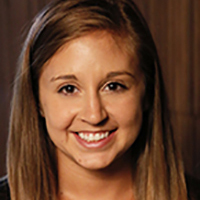 Tip for undergrads: you can satisfy the requirements of a major in Biology and a minor in Spanish by taking classes on minority health issues. As Sarah Wetter found, you will also uncover inequities in the fabric of health policy – a mismatch in information and resources available for people in need. Working in that setting convinced Wetter that she wanted to institute wider changes in public health policy than could be accomplished one-on-one with patients. Her next step was to find the right law school.
Tip for undergrads: you can satisfy the requirements of a major in Biology and a minor in Spanish by taking classes on minority health issues. As Sarah Wetter found, you will also uncover inequities in the fabric of health policy – a mismatch in information and resources available for people in need. Working in that setting convinced Wetter that she wanted to institute wider changes in public health policy than could be accomplished one-on-one with patients. Her next step was to find the right law school.
Where they speak my language
Wetter was attracted to the Sandra Day O’Connor College of Law (ASU Law) by the opportunity to study public health law, emerging health technologies, and public policy. And she certainly made use of her time as a law student. She worked as a student researcher in the Center for Public Health Law and Policy (CPHLP), led by Professor James G. Hodge, Jr.. CPHLP works closely with scholars, practitioners, policymakers, and public health agencies to address critical challenges including emergency legal preparedness, obesity and injury prevention, vaccination policy, health care reform, and more.
She was also drawn to the Center for Law, Science & Innovation (LSI) for its unique focus and coursework that “spoke my language,” to be able to take classes in scientific and cross-disciplinary areas of interest, and not just legal doctrine. Wetter was an LSI Center Scholar for three years and graduated with a Law, Science & Technology Certificate focused in Health Law. She remains connected to LSI as a Research Fellow, as much of her current work intersects with LSI programs on biotechnology, advances in the life sciences, and health information security.
Jurimetrics: reaching a broad audience
Wetter now works, in part, to provide better tools for officials evaluating public health policy and emergencies like the opioid epidemic, which claims the lives of almost 150 people every day across the country. To this end, she recently co-authored an article with Professor Hodge and law students Danielle Chronister, Alexandra Hess, and Jennifer Piatt: Redefining Public Health Emergencies: The Opioid Epidemic.
The article, which will lead off the Fall 2017 issue of Jurimetrics: The Journal of Law, Science, and Technology, lays out useful criteria for evaluating public health emergencies and argues that the opioid crisis, and similar public health issues, can qualify for useful emergency declarations.
While in law school, Wetter served as Editor-in-Chief of Jurimetrics, the peer-reviewed publication of the ABA Section of Science & Technology Law housed within LSI. In that role, she enjoyed the exposure to high-quality scholarship and the opportunity to work directly with preeminent authors. The journal’s focus on the scientific and technical aspects of the law made it a good fit. Jurimetrics boasts a “larger reader base than just lawyers. You know that researchers, academics, and others are reading,” said Wetter.
Sharing public health law expertise, tools, and information
As a law student, during a summer away from CPHLP, Wetter secured the coveted chance to work in a legal internship with the Centers for Disease Control and Prevention’s (CDC) Public Health Law Program in Atlanta, Georgia. There she worked on assessing whether state laws are properly geared to promote the exchange of health information and facilitate the sharing of patient data among health care settings. Wetter continued working on this project after her internship and recently published an article on the topic in the Journal of the American Medical Informatics Association.
Today, Wetter is a Research Scholar with CPHLP and a Staff Attorney for the Western Region of The Network for Public Health Law (Network). The Network, largely funded by the Robert Wood Johnson Foundation, provides technical legal assistance and topical expertise in public health law to practitioners, policymakers, advocates, attorneys, and students nationally.
Wetter researches, writes, and speaks on issues of public health policy. She recently moderated a panel for the Public Health and Healthcare Services, Law, Policy and Equity division of the Arizona Wellbeing Commons, a network of researchers working on health issues impacting Arizona. She also responds to request for technical assistance on public health law issues from officials and individuals across the country.
“A lot of jurisdictions don’t have public health law expertise,” said Wetter. But Network attorneys like Wetter provide tools and information to people implementing health policy every day, covering topics like emergency preparedness, vaccines, and health data sharing under HIPPA.
As a very young attorney, Wetter has been able to establish herself as a scholar, educator, and source of information in a complex area of law, thanks in part to her work at ASU Law. She has authored and co-authored more than a dozen articles published in prestigious journals on a wide range of topics, including emergency preparedness, legal preemption and public health innovation, and challenges to health data exchange. She is also in demand as a presenter, moderator, and guest lecturer on public health law. For more on Wetter’s activities, check out her impressive CV.
Wetter will clearly continue to make an impact in her field, but she knows that public health policy develops slowly. Solving some public health problems involves not only changes to medical practice, but to our culture. Not an easy nut to crack. But Wetter is happy to keep working on it. “You have to know that you’re contributing by putting these ideas out there in an effort to improve health equity.”
















